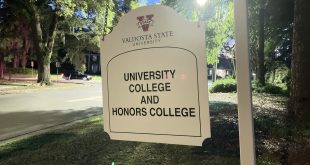“I am somebody.”
This was the chant of Evelyn Thomas and 12 other veterans as they stood handcuffed to the gates of the White House on Nov. 15, 2010, protesting the “Don’t Ask, Don’t Tell” policy.
As Thomas was arrested and carried away by police, she kept chanting, “I am somebody.”
Cpl. Evelyn Thomas joined the Army National Guard on May 17, 1986, at the age of 17. She was transferred from the National Guard to the U.S. Marine Corps in Camp Pendleton, Calif., but was honorably discharged in 1991 after a fellow Marine turned in a letter from Thomas’ mother.
In the letter, Thomas’ mother asked her about a woman she was dating.
“When they asked me if I’m a homosexual–I literally began to shake in my boots because I thought, ‘How did they find out?’” Thomas said in an interview with Color Lines Action News. “As I’m standing there shaking, my commanding officer and my supervisor began to laugh, because they thought it was funny.”
Before Thomas got involved in the protest of Don’t Ask, Don’t Tell, she founded The Sanctuary Project, a nondenominational ministry.
“We’re a ministry of works,” Thomas said. “Not just words.”
The Sanctuary Project was established after the death of African-American Seaman August Provost, who was murdered in June 2009 while on active duty. Provost was bound and gagged, then shot and burned to death. It was widely rumored that his death was a consequence of being openly gay.
“My first thought after telling my wife was, ‘They are going to kill us all, until there are none of us left,’” Thomas said. “Then I decided to create a safe place– a sanctuary.”
The Sanctuary Project soon grew to provide not only a safe place for those serving under Don’t Ask, Don’t Tell, but also everything from emotional support, to rides to hospitals. The Sanctuary Project also took up the task of informing family members of the death of a service member if the military should fail to recognize a person’s partner as a family member.
“Seaman August Provost was gay and was in a relationship,” Thomas said. “His department of the Navy didn’t notify his partner of his death, and the way he found out was a reporter calling his house and asking, ‘How do you feel about your boyfriend’s death?’”
After Thomas’ Sanctuary Project grew and gained recognition, she was contacted by Get Equal, an organization dedicated to full legal and social equality for LGBTQ community, about the Don’t Ask, Don’t Tell protest at the White House.
Initially Thomas had her doubts about participating in the protest.
“I was a high school teacher at the time,” Thomas’ said. “As the first in my family to go to college, I was immediately concerned about losing my teaching career. I decided to go, but not handcuff myself to the fence.”
But once the group arrived in Washington, Thomas experienced a change of heart.
“In the media surrounding Don’t Ask, Don’t Tell, you saw a lot of Caucasian males, but the largest population impacted by the policy, were women of color, “ Thomas said. “I saw them practicing how to conceal the handcuffs, and how to walk up to the fence, pretending like they were tourists, just taking a picture, and I knew I had to get the face of the women affected out into the media. I did it at the last minute, without any sort of discussion with my wife.”
The group included Lt. Daniel Choi, Petty Officer Autumn Sandeen and Former U.S. Army Staff Sergeant Miriam Ben-Shalom, the first LGBT service member reinstated to her position in the U.S. Military by a U.S. Federal District Court.
“While I was standing there, I was really nervous,” Thomas said. “There were cameras directly in our faces.”
After several members of the group gave speeches and chanted, the police began cutting the handcuffs and arresting the protestors. Thomas continued chanting while being carried to a police van.
While sitting in her cell that night, Thomas began to doubt her decision to participate in the protest.
“While I was sitting there, I saw a cockroach crawling on the wall towards me,” Thomas said. “I said to myself, ‘Why am I here? Why did I do this?’ Then I thought, ‘Please don’t let my mom find out I went to jail.’”
Before deciding that her actions were not worth their consequences, Thomas remembered the words of two of her greatest inspirations, Rosa Parks and Dr. Martin Luther King Jr.
“They said ‘You have to do this. You’re not doing this for yourself. You’re doing it for the men and women who have to serve in silence,’” Thomas said. “After that, I was at peace. Women were screaming in cells on both sides of me, but I was at peace.”
Today, Thomas is a free woman with plenty to smile about. Don’t Ask, Don’t Tell was repealed Sept. 20, 2011 and Thomas was able to meet President Obama and witness the repeal of the policy.
“If you watch the video of Obama signing the repeal, you can hear in the background, ‘President Obama, you rock!’” Thomas said. “That was me! Afterwards, he came right down to us. I thanked him for signing the repeal and I gave him a big bear hug!”
Thomas has been legally married to her wife Linda Sanders for four years and both are still active members of The Sanctuary Project. Both Thomas and Saunders were present at this year’s South Georgia Pride festival, held Saturday at John W. Saunders Memorial Park. The repeal of Don’t Ask, Don’t Tell prompted the festival’s theme, Serving with Pride.
Thomas sat at a booth representing The Sanctuary Project and also gave the festival’s opening speech, starting with the same lines she chanted at the White House protest, “I am somebody.”
Thomas was excited about the festival ever since meeting Raynae’ Williams, South Georgia Pride’s assistant executive director, and being offered to speak at the opening ceremony.
“I can’t explain it,” Thomas said. “All the challenges that every activist, and every ally went through was worth it.”
Looking back on all her experiences since joining the military, Thomas regrets nothing.
“Helping other is all I want to do in life,” Thomas said. “That’s why I became a teacher—an open LGBT educator. I wanted to be a role model and demonstrate to them that despite the hate in the world, there are people that care and love us. We can survive this.”
 The Spectator The independent student newspaper of Valdosta State University
The Spectator The independent student newspaper of Valdosta State University




